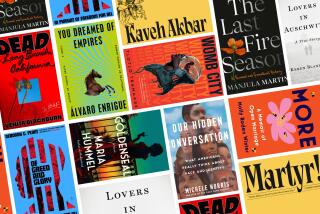Southern Tales, Tall and ‘Down-home’
Since her lonely death in 1960, Zora Neale Hurston has risen to be enshrined in the literary pantheon. Her novel “Their Eyes Were Watching God” (1937) holds a deservedly prominent place in the African American and feminist literary canon and is taught widely at colleges and universities across the country. So widely, in fact, that it is of considerable interest that an unpublished manuscript of Hurston’s has now come to light.
The manuscript of “Every Tongue Got to Confess” languished for 30 years in “a basement storage room at Columbia University,” explains the volume’s editor Carla Kaplan, and for another 20 years at the Smithsonian. The book’s great value for us today is in the way it returns us to Hurston’s literary and academic roots as a folklorist and anthropologist and to the people and material which inspired and enriched her fiction.
From her birth in 1891 in Notasulga, Ala., and childhood in Eatonville, Fla., the first incorporated black town in the United States, Hurston grew up valuing the music and rhythms of black speech as well as the folk tales and songs that would be central in her writing career.
Hurston entered Howard University in 1920 and, within a year, had a story published in the school’s literary magazine. In 1925 a story was published by Opportunity, a New York black literary magazine important in that coalescing of writers and artists that would come to be known as the Harlem Renaissance. Hurston moved to New York and soon became friends with Langston Hughes, Arna Bontemps and the artist Aaron Douglas, among others. (I minored in art at Fisk University in the late 1950s where Douglas was chairman of the art department. He remembered Hurston with fondness and would chuckle recalling her flamboyance and her ability to amuse everyone with her “down-home” stories.)
Her interest in “down-home” stories led to the study of anthropology at Barnard College with the eminent Franz Boas, and to field trips across the South and the Caribbean. During her lifetime, two books of tales and lore were published: “Mules and Men” (1935) and “Tell My Horse” (1938). The latter is a study of Haitian and Jamaican voodoo. The more important book is “Mules and Men,” a pioneering work of black tales and voodoo: It is not merely a compendium of tales because it also places the tales in their social and cultural context. The reader experiences the community from which the tales emanated as well as the roles the tales played in the life of the community.
In “Every Tongue Got to Confess” we are presented with the raw material from which Hurston created “Mules and Men.” That includes such wonderful classics as “Why the Porpoise has his Tail on Crosswise,” “How the Lion Met the King of the World,” “Why the Waves Have Whitecaps” and the monumental “How Jack Beat the Devil.” Thecollection contains variants of these and many other tales already found in “Mules and Men.”
Hurston wanted “Every Tongue Got to Confess” to be different. “I am leaving the story material almost untouched,” she wrote in a letter to Hughes and quoted by Kaplan. “I have only tampered with it where the storyteller was not clear. I know it is going to read different, but that is the glory of the thing, don’t you think?”
But none of the material here can match that in “Mules and Men” for precision of telling, rhythm, imagery and enjoyment. “Every Tongue Got to Confess” contains more jokes than traditional tales, the difference being not only the shorter length of jokes and their emphasis on a punch line but also that folk tales have a complexity and depth that reverberates after the laughter dies. Missing from this volume is the almost epic dimension of the best tales in “Mules and Men.”
However, folk tales, even jokes, are always valuable because one of the best ways to understand a people and the challenges they have faced is to study their stories. In this collection we learn much about the attitudes of Southern black rural life in the 1920s. There is the tale about the preacher who goes to heaven and learns that God has a “big blackboard” and, as the angel John reads aloud your sins from “de Big Book,” you have to write them down. According to the storyteller, “my uncle died ‘bout twenty years ago an’ went on up. He wuz uh big preacher an’ everybody said he sho wuz gointer git uh good seat on de right hand side, right up tuh de throne. But last week somebody died an’ went up an’ met my uncle on de way back to do earth tuh git some more chalk.” Ministers never fare well in black folk tales.
The reader also finds some wonderful exaggerations about weather and the environment. “I have known it to get so cold that you would have to carry a bucket along so when someone talked to you, you would have to put the words in the bucket and carry them home and put the bucket on the stove and let the words melt.” Or what about the time it was so hot “you had to feed the hens cracked ice to keep them from laying hard-boiled eggs.” When asked who was the shortest man someone had ever seen, the response was, “I seen uh man so short he had tuh get upon uh box tuh look over uh grain uh sand.”
This collection was supposed to have been published in 1929 and it is not clear why it wasn’t. Kaplan quotes Hurston’s biographer, Robert Hemenway, who speculates that “Hurston’s publishers demanded something more than the mere transcription of collected tales.” If so, the publishers were correct. “Every Tongue Got to Confess” is of historical interest as is anything with which Hurston was involved. But this collection throws into relief what an incredible job of editing and writing Hurston did in “Mules and Men.”
*
From “Every Tongue Got to Confess”
“Pig in de Poke”
One time way back a white man sent his Negro hand to another plantation to get a pig for him. He went and got it, but on the way back it was hot and he was tired, so he sat down to rest and dozed off to sleep. Some white men came along and saw him. They knew who he was and everything, so they thought it would be fun to take out the pig and put in a possum--so they did.
When he got home his boss asked him, “Well, Sam, did you get the pig?” “Yassuh, an’ he sho is uh fine one, too. He kin crack corn already.” “Well, let’s see him.” Sam poured the possum out of the bag, thinking it was the pig. He looked, the white man looked, neither one didn’t want to believe his eyes. “Look here, Sam, is you dat big a fool to let ‘em put a possum off on you for a pig?” “Boss, I ‘clare dat wuz uhh pig when I put ‘im in dere.” “Well, you just turn round and go right back over the creek and get me a pig. Furthermore, you tell Hiram Bickerstaff he better not try any tricks on me, else I’ll sink him wid lead.”
The Negro went on back and he was awful tired by this time, so he sat down at the same place and went to sleep again. The men saw him and knew what he was going back for, so they slipped the pig back into the bag and went away. When he woke up he heard the pig grunting in the bag and peeped in to see if it really was a pig again. He looked at the pig and scratched his head and said: “Pig, be somebody. Don’t be switching back and forth. Either be a pig or a possum, but be whut you is.”
“Why God Made Adam Last”
God wuz through makin’ de lan’ an’ de sea an’ de birds an’ de animals an’ de fishes an’ de trees befo’ He made man. He wuz intendin’ tuh make ‘im all along, but He put it off tuh de last cause if He had uh made Adam fust an’ let him see Him makin’ all dese other things, when Eve wuz made Adam would of stood round braggin’ tuh her. He would of said: “Eve, do you see dat ole stripe-ed tagger (tiger) over dere? Ah made. See dat ole narrow geraffe (giraffe) over dere? Ah made ‘im too. See dat big ole tree over dere? Ah made dat jus’ so you could set under it.”
God knowed all dat, so He jus’ waited till everything wuz finished before he made man, cause He knows man will lie and brag on hisself tuh uh woman. Man ain’t found out yet how things wuz made--he ain’t meant tuh know.
--From “Every Tongue Got to Confess” by Zora Neale Hurston (HarperCollins)
*
Julius Lester is the author of 34 books, including “Black Folktales,” which includes retellings of tales collected by Zora Neale Hurston, and the novel “When Dad Killed Mom.”
More to Read
Sign up for our Book Club newsletter
Get the latest news, events and more from the Los Angeles Times Book Club, and help us get L.A. reading and talking.
You may occasionally receive promotional content from the Los Angeles Times.







